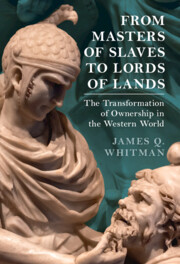Book contents
- From Masters of Slaves to Lords of Lands
- Studies in Legal History
- From Masters of Slaves to Lords of Lands
- Copyright page
- Dedication
- Contents
- Acknowledgments
- Introduction: Owning Humans, Owning Land – Two Primitive Modes of the Property Imagination
- Part I Masters of Men and Beasts
- 1 Hierarchy and the Hunt for Prey: Early Human Ownership
- 2 Masters of Men and Beasts: The Early Roman Fantasia of Ownership
- 3 The Dominus Enters the Law
- 4 Classical Roman Slave Law: The Just Hunt for Human Prey
- 5 An Empire of the Chieftainship over People
- Part II From Masters to Lords
- Conclusion: From Man the Killer to Man the Tiller
- Bibliography
- Index
- Studies in Legal History
2 - Masters of Men and Beasts: The Early Roman Fantasia of Ownership
from Part I - Masters of Men and Beasts
Published online by Cambridge University Press: 28 November 2024
- From Masters of Slaves to Lords of Lands
- Studies in Legal History
- From Masters of Slaves to Lords of Lands
- Copyright page
- Dedication
- Contents
- Acknowledgments
- Introduction: Owning Humans, Owning Land – Two Primitive Modes of the Property Imagination
- Part I Masters of Men and Beasts
- 1 Hierarchy and the Hunt for Prey: Early Human Ownership
- 2 Masters of Men and Beasts: The Early Roman Fantasia of Ownership
- 3 The Dominus Enters the Law
- 4 Classical Roman Slave Law: The Just Hunt for Human Prey
- 5 An Empire of the Chieftainship over People
- Part II From Masters to Lords
- Conclusion: From Man the Killer to Man the Tiller
- Bibliography
- Index
- Studies in Legal History
Summary
This chapter discusses archaic Roman property law, whose symbolism and terminology show a striking orientation toward the ownership of living creatures, human and animal. That symbolism and terminology was seized upon by many of the leading thinkers of the past, who believed it offered clues to the origins of human society. It was also seized upon by both Communist and Fascist ideologues. Today, by contrast, its significance is generally dismissed. Modern scholarship has been heavily dedicated to reconstructing the socio-economic realities; scholars often deploy their learning to dispel the “myths” in the sources, among them the myths in the archaic Roman sources. Yet the myths matter; “idioms of power” cannot simply be written off. The chapter brings the anthropology of property law to bear on the interpretation of these mysterious sources, and describes the long intellectual and political history of their interpretation and ideological use.
- Type
- Chapter
- Information
- From Masters of Slaves to Lords of LandsThe Transformation of Ownership in the Western World, pp. 75 - 124Publisher: Cambridge University PressPrint publication year: 2025

